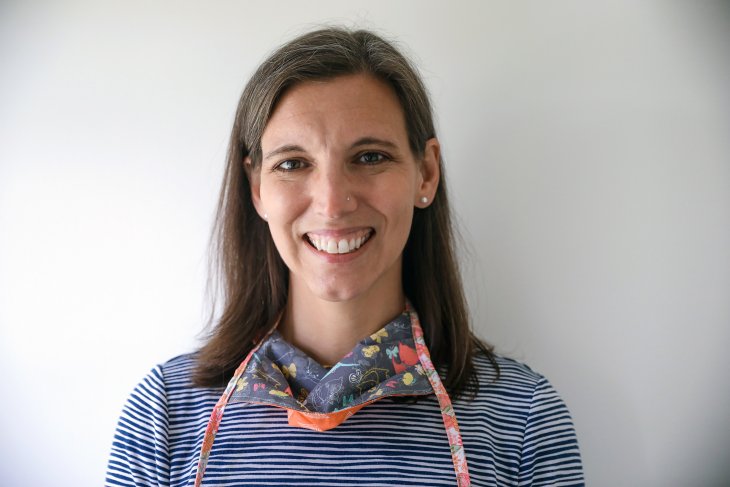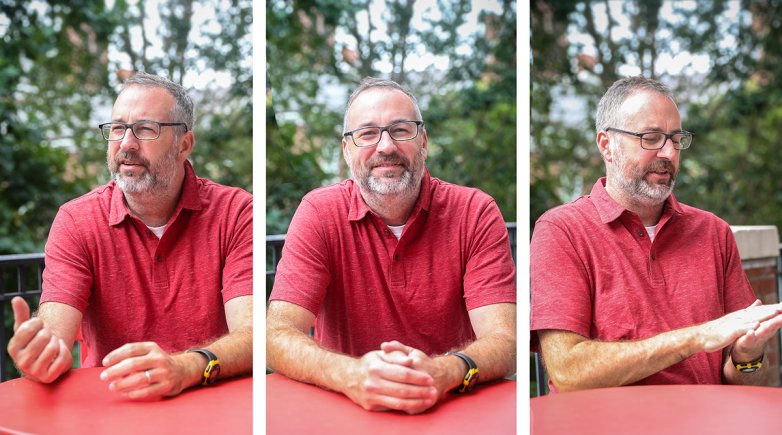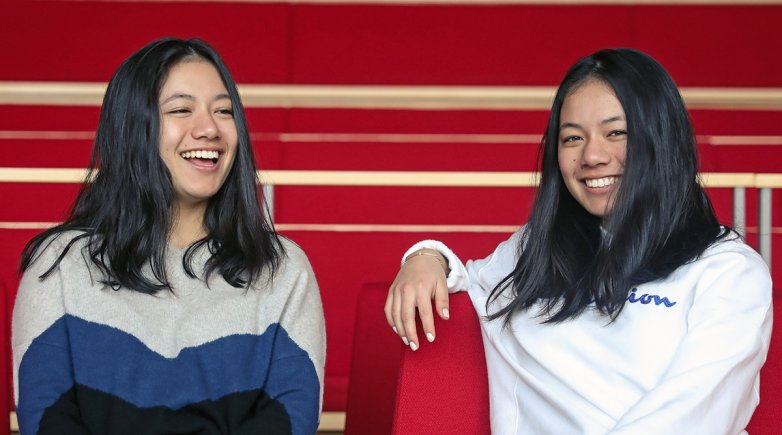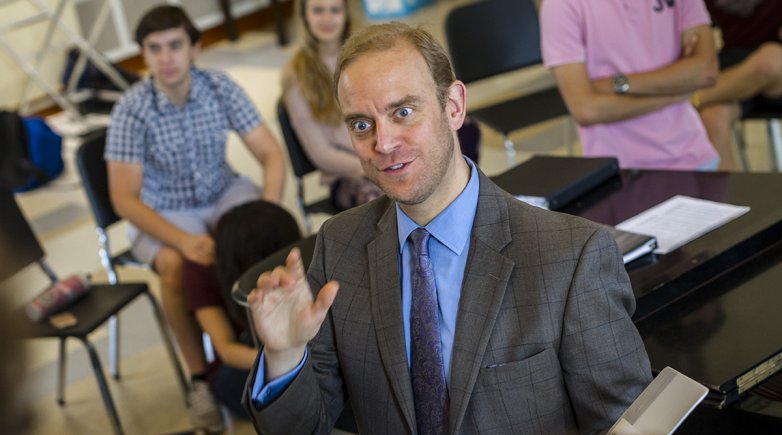Dr. Katy Lilly

"We really are thinking outside the box right now."
A practicing physician for 16 years and the Academy’s medical director since 2018, Dr. Katy Lilly oversees nearly 50 professional caregivers, including dieticians, counselors, nurses and athletic trainers. She and her staff attend to some 17,000 visits each academic year on the medical floor of the Lamont Health and Wellness Center alone.
When the World Health Organization (WHO) declared the novel coronavirus outbreak a public health emergency of international concern, life changed, and with it, Dr. Lilly’s role. As an essential member of the Academy’s Incident Response Team (IRT), she has been a leading voice of scientific and medical information for the Exeter community. She helped draft the Academy’s initial pandemic response plan, developed quarantine guidelines and best practices for students and their families, and continues to guide protocol for reopening campus in the fall.
We met with Dr. Lilly (6 feet apart) at the eerily empty health center to hear about her experience.
You can’t plan for a pandemic, can you?
Actually, [Director of Campus Safety] Paul Gravel had reached out to me a few years ago, when I first started here, and said, “You know, we don’t have a pandemic plan.” So he and I worked for several weeks and came up with an outline. We put this framework out there, but it was just sitting in Dropbox. I thought we’d never need it. And then in February, Paul reached out to say, “Alert, should we be thinking about pulling this Incident Response Team together?”
What were your next steps?
We started meeting with the IRT, running through our pandemic plan, which nicely aligned with what was coming through the WHO guidelines. We found very quickly that meeting once a week was not enough, and we ended up meeting at least daily. One night I counted my emails to see how many I got. It was 216 in a day.
What were you deciding on in those hundreds of emails?
There was so much to figure out, as students were getting ready to go home for spring break and we had kids abroad. Thankfully, we were able to get all of our students home safely from abroad, and then all of our students from spring break home. At the time, it was really more trying to keep the virus out, rather than contained within.
Did you feel prepared for this?
No! Who would ever feel prepared for a pandemic? A true pandemic like this is stuff that you read in science fiction novels. … But this is our day to day. I spend my days thinking about how to make “now” OK. It’s a lot of work, but it’s a lot of interesting work, and I feel fortunate to be working with really great teammates.
How do you create guidelines when what we know about the virus changes almost daily?
On Monday we make a plan. And then on Tuesday we revise it. And then on Wednesday we change it. And then on Thursday we’re back to the original plan. That’s what you have to be, flexible. You have to be nimble.
What were some other key moments for you over the last few months?
Maybe the most pivotal discussions we had were about spring term and changing to remote learning. That was just huge. The impact that has on students and families who maybe weren’t expecting to have their students home, who don’t have physical space for them to be home, who don’t have mental wherewithal to have their student home. …
Sounds like a lot of big-picture thinking rather than the usual bedside doctoring.
I joked with [Dean of Faculty] Ellen Wolff yesterday [that] I really just want to write a prescription for antibiotics for a sinus infection. But it’s good. I do like the mental effort it takes to think about public health. And that’s really one of the reasons I liked coming [to Exeter], was that combination of individual care and public health oversight.
Do you have thoughts on opening the campus in September?
Oh yes. Those are all of my thoughts right now. I am working really hard from a medical point of view, thinking about preventing cases as much as possible, but then also realistically, we’ll likely have cases if we have students here. How do we manage those cases, and how do we do contact tracing? How will we do testing? There’s lots to do for this even though there’s no true treatment.
How would contact tracing work?
That’s going to be an arena where we are using some cutting-edge technology to our advantage. Getting in on the ground level of the new tests, thinking about ways that we can maybe use [technology] to safely, appropriately, without identifying names, make contact tracing doable.
Can you tell me what social distancing in the classroom might be like?
We really are thinking outside the box right now. We’re creating things that haven’t been done before. Yesterday we sat around the Harkness table, took out a measuring stick and put 6 feet between us, and we said, OK, we are going to go from 12 students to four if we don’t make any modifications in a class. Then I said, “What are the modifications we can do?” We all had our masks on, and while we were talking through the masks we realized you can’t see facial expressions. You can’t even always understand people’s words. We have some very lovely, soft-spoken students and I just thought, they’re going to get lost in a mask. So we thought, should we do face shields instead of masks? Can we do Plexiglas partitions?
How do you balance safety and maintaining the Exeter experience?
Exeter is so interestingly collaborative. Harkness allows kids to really be together and brainstorm and develop relationships, which they should. I’m trying to keep that in mind with every plan. We could be very draconian about it and say everyone is basically going to live in a bubble. But that’s not fair to students, that’s not the Exeter experience that people deserve. So, it’s finding that balance between safety and self-fulfillment.
What about opening the health center? How would that work?
We’re thinking about the health center flow. Are we going to have an app where students can check in from their phone rather than coming up to the front desk? Are we going to be doing more telemedicine with our well students so they don’t have to come inside the health center? It’s an entirely different flow, every single part of the day.
Meanwhile, you’ve done some concrete things along the way as well.
We have been in close touch with the town, with the state health department. Exeter Hospital reached out to us early on, before any of the National Guard field hospitals were up, and asked if we had any capacity. They reached out to us on a Friday, and by Monday we had our general counsel and their general counsel sign off on the agreement to allow them to use [the Lamont Health and Wellness Center].
Did you also donate supplies?
We did. We donated several hundred N95 masks to Exeter Hospital and some other surgical masks to Riverwoods [retirement community].
Did you always want to be a doctor?
Always. For as long as I can remember. I love science. I love physiology. I love caring for people. There were some pivotal things that happened in my adolescence that steered me toward the medicine that I do now. One is really timely. I’m a self-proclaimed nerd at heart, and I went to a conference for girls in STEM when I was 15 at the University of Maryland. I went to a session with Dr. Anthony Fauci and thought, who is this guy? He is amazing. After the talk, he took us on a tour of the National Institutes of Health to see the real applications of all that research. So now when I see him on the news I’m like, guys, guys, I got to meet him!
Have your views on scientific research evolved due to the coronavirus?
I have a new appreciation for science and the amount of gray it has in it. It can take a very long time for any scientific or medical theory to become black and white. So, I think just having a healthy respect for not having control over something.
Do you see any positive takeaways from this pandemic experience?
I think we all know that this is disproportionately affecting persons of color, perhaps underprivileged populations. The virus just amplifies what we knew historically, that we need to be doing a better job of getting health care to everyone in this country. I think that will be a positive change that comes out of this. I think that public health is now going to be viewed with the respect it deserves.
Personally, what will you take away?
Being able to spend time with my family at home. Never in my life would I have thought, being a physician, [that] I would be working from home. Those two things do not go together. To be able to do that, and be with my children — really be there for them as they’re going through their own losses and sadness and grief over being distant — I think is really special. It’s a real blessing.
— Jennifer Wagner



